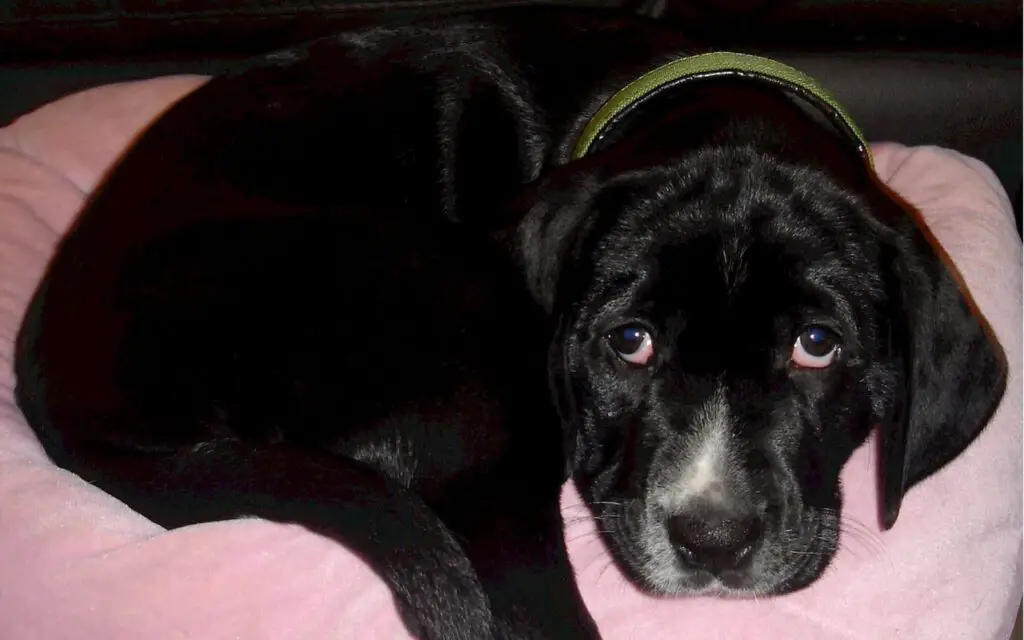When it comes to our beloved furry companions, many of us are concerned about their health and well-being.
One common issue that can affect both cats and dogs is swollen lymph nodes.
While the causes of this condition vary from pet to pet, one common symptom associated with swollen lymph nodes in dogs is a persistent cough.
In this blog post, we will discuss what causes swollen lymph nodes in dogs, the potential symptoms that may arise from this condition, and how to best treat a dog with swollen lymph nodes.
- Key Takeaway
- Can Swollen Lymph Nodes Cause Cough?
- Does Lymphoma In Dogs Cause Coughing?
- Can a Dog Have a Dry Cough With Swollen Lymph Nodes?
- Should I Be Worried If My Dogs Lymph Nodes Are Swollen?
- What Causes Swollen Lymph Nodes And Cough In Dogs?
- FAQs
- Q: What are the causes of swollen lymph nodes?
- Q: Where are lymph nodes located in dogs?
- Q: How are swollen lymph nodes diagnosed?
- Q: What are the treatment options for swollen lymph nodes?
- Q: Can kennel cough cause swollen lymph nodes in dogs?
- Q: Should I be concerned if my dog has swollen lymph nodes?
- Q: What are the symptoms of swollen lymph nodes in dogs?
- Q: Can swollen lymph nodes in dogs be a sign of cancer?
- Q: Can swollen lymph nodes in dogs go away on their own?
- In Conclusion
Key Takeaway
- Dogs can develop a cough as a result of swollen lymph nodes, particularly if the enlargement is near the heart and lungs or due to conditions like kennel cough.
- You should be concerned if your dog’s lymph nodes are swollen, as it could indicate various conditions including infections, allergies, or even cancer, thus requiring immediate veterinary attention.
- Swollen lymph nodes and cough in dogs can be caused by a variety of conditions such as bacterial or fungal infections, inflammation, diseases like kennel cough, or serious illnesses like cancer, where swollen lymph nodes near the heart could press on the dog’s windpipe causing the cough.
Can Swollen Lymph Nodes Cause Cough In Dogs?

Yes, the swelling of lymph nodes in dogs, particularly those near the heart and lungs, can induce coughing as a result of compression.
It’s also common for dogs to exhibit symptoms like fever, lethargy, poor appetite, and an enlarged abdomen alongside swollen lymph nodes.
There are a variety of causes for swollen lymph nodes in dogs, including bacterial, tick-borne, fungal, and parasitic infections.
Additionally, conditions like kennel cough can cause swollen tonsils or lymph nodes along with a deep, persistent cough.
If a dog shows signs of coughing, sneezing, difficulty breathing, or swollen lymph nodes, it’s crucial to seek veterinary care right away.
Does Lymphoma In Dogs Cause Coughing?

Yes, when lymphoma is located in the chest cavity or mediastinal area, it can indeed cause dogs to cough.
The enlarged lymph nodes due to the disease could lead to breathing difficulties and coughing.
However, it’s important to note that coughing can be a symptom of various conditions in dogs, not just lymphoma.
Can a Dog Have a Dry Cough With Swollen Lymph Nodes?
Yes, a dog can have a dry cough alongside swollen lymph nodes, often as a symptom of conditions like kennel cough or certain infections.
Kennel cough typically presents with symptoms including fever, swollen tonsils or lymph nodes, and a deep, hacking cough that is usually dry.
Swollen lymph nodes in dogs, a condition known as lymphadenopathy, can also lead to symptoms like coughing.
Furthermore, certain infections and even cancer can cause lymph node enlargement around the heart and lungs, leading to a cough due to compression.
Therefore, if a dog is presenting with a dry cough and swollen lymph nodes, it’s important to seek veterinary care for appropriate diagnosis and treatment.
Should I Be Worried If My Dogs Lymph Nodes Are Swollen?
Yes, you should be concerned if your dog’s lymph nodes are swollen.
Swelling of the lymph nodes in dogs can indicate various health conditions ranging from infections (bacterial, viral, fungal, or parasitic), inflammation, and allergic reactions, to serious diseases like cancer.
While not all lymphadenopathies are cancerous and benign tumors can also cause the lymph nodes to swell, it is crucial to seek veterinary attention promptly.
Even though the lymph nodes themselves rarely need treatment, the underlying condition causing their swelling might be severe and requires evaluation and potentially immediate treatment.
What Causes Swollen Lymph Nodes And Cough In Dogs?
- Swollen lymph nodes in dogs, also known as Lymphadenopathy, can be caused by many different diseases, including bacterial or fungal infections.
- An infection can arise from either a bacterial or fungal infection, which is both a treatable and curable illness. In contrast, inflammation can also cause swollen lymph nodes.
- Swollen lymph nodes in dogs can be a sign of many diseases and infections of tissue throughout the body.
- Sometimes coughing in dogs is caused by pressure from swollen lymph nodes near the heart pressing on the dog’s windpipe and irritating it.
- Kennel Cough, a disease similar to the human cold or flu, can also cause symptoms such as fever, swollen tonsils or lymph nodes, and a deep, persistent cough.
- Bacterial infections and fungal infections in dogs can cause lymph nodes to enlarge in one part of the body or in several, depending on how widespread the infection is.
FAQs
Q: What are the causes of swollen lymph nodes?
A: Swollen lymph nodes in dogs can be caused by various factors such as infections (bacterial, viral, or fungal), immune system disorders, cancer, or even certain medications.
Q: Where are lymph nodes located in dogs?
A: Dogs have lymph nodes located throughout their body, including the submandibular lymph nodes (under the jaw), axillary lymph nodes (in the armpits), inguinal lymph nodes (in the groin area), and popliteal lymph nodes (behind the knees).
Q: How are swollen lymph nodes diagnosed?
A: To diagnose swollen lymph nodes in dogs, a veterinarian will perform a thorough physical examination, may run blood tests, and may recommend additional diagnostic tests such as fine needle aspirate or biopsy to determine the underlying cause.
Q: What are the treatment options for swollen lymph nodes?
A: The treatment for swollen lymph nodes in dogs depends on the underlying cause. It may include antibiotics for infections, chemotherapy for cancer, or immune system-modulating medications for immune system disorders. Treatment should be determined by a veterinarian based on the specific case.
Q: Can kennel cough cause swollen lymph nodes in dogs?
A: Yes, kennel cough can result in swollen lymph nodes in dogs. Kennel cough is a highly contagious respiratory infection that can cause inflammation and infection in the respiratory system, leading to swollen lymph nodes.
Q: Should I be concerned if my dog has swollen lymph nodes?
A: Swollen lymph nodes in dogs can be a sign of various underlying issues. While some cases may be relatively harmless, it is always recommended to have your dog seen by a veterinarian to determine the cause and appropriate treatment.
Q: What are the symptoms of swollen lymph nodes in dogs?
A: In addition to the visible swelling of the lymph nodes, other symptoms can include lethargy, loss of appetite, weight loss, coughing, difficulty breathing, and changes in behavior.
Q: Can swollen lymph nodes in dogs be a sign of cancer?
A: Yes, swollen lymph nodes in dogs can be a symptom of cancer. However, not all cases of swollen lymph nodes are due to cancer, so it is important to have your dog thoroughly evaluated by a veterinarian to determine the cause.
Q: Can swollen lymph nodes in dogs go away on their own?
A: Swollen lymph nodes can sometimes resolve on their own if the underlying cause is a mild infection. However, it is always best to have your dog evaluated by a veterinarian to ensure proper diagnosis and treatment.
In Conclusion
In conclusion, swollen lymph nodes can indeed cause a cough in dogs.
While the condition is not usually serious, it is important for pet owners to be aware of the signs and symptoms so they can seek medical attention if necessary.
If your dog has a persistent cough that is accompanied by swollen lymph nodes, you should take them to their veterinarian as soon as possible for diagnosis and treatment.


Leave a Reply